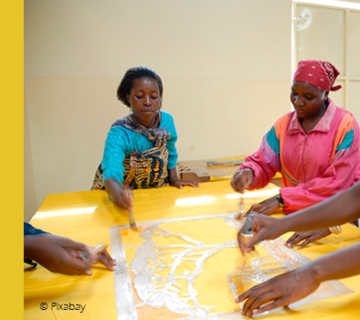The most radical choice in Chiara Lubich’s life was to love Jesus above all in his greatest pain: his abandonment on the cross. But loving “Jesus Forsaken” means, therefore, above all loving those neighbours whom we feel most “distant” from us.
“Anyone who gets angry with his brother is subjected to judgment” 1. […] Once again, love for our neighbour is underlined. And it’s useful, it’s necessary, it’s good for us to keep this in mind. The general aim of the Movement is the perfection of charity. We are called to love each brother and sister with a love than is more and more felt; a love that is ever more profound and perfected; a love that is ever more refined.
At times, we feel that it is difficult to bend our heart to exercise a more refined love than the one we already have for our brother or sister: our heart is still partly made of stone; our love is rough, superficial, too hasty.
Why? Because our hearts are still occupied by ourselves, by a certain consideration of ourselves. We are, even if we don’t realize it, selfish and proud.
And this is demonstrated by the fact that when we undergo some severe spiritual test (which, like an earthquake, seems to eradicate everything at the root, thus having the effect of detaching us from ourselves, from our possessions and humiliating us, lowering our pride), we are aware of a more understanding love; a deeper, easier, more spontaneous love towards our brothers and sisters. That’s how it is. It therefore follows that poverty and humility are the basis of charity.
Poverty and humility.
How can we obtain them, how can we earn them without waiting for spiritual storms? […] It is necessary to “live the other” […] and this implies not taking account of oneself; having total poverty and total humility. […] Let us encounter our neighbours in a perfect attitude of welcoming their life in us. […] And since we are talking about neighbours, let’s ask ourselves: Whom should we love first? Whom should we love more? Whom should we have a preference for?
We have chosen Jesus Forsaken. We must prefer those who, on account of their condition and because of the situations in which they find themselves, in some way remind us of his face: those who, although being Catholic, live separated from the Church; and then all those who in various ways are more or less distant from the truth that is Christ, including non-believers.
Above all, we must go towards these.
Do we want to keep in touch with those with whom we have shared our Ideal? Perhaps through letters, visits, or telephone calls.
Let’s start with the people, who in a certain way, are furthest away from us.
Let us revive our love for our brothers and sisters by making ourselves so one with them that we live – so to speak – their life. And let’s start with those who appear to us furthest from our evangelical way of thinking and living […] Jesus Forsaken awaits us there. Our place is there.
Chiara Lubich
(in a telephone conference, Rocca di Papa, February 12, 1987)
1) Mt 5,22


 Italiano
Italiano Español
Español Français
Français Português
Português




Quale migliore sintesi per la vita di un cristiano
Grazie Chiara
Grazie Chiara